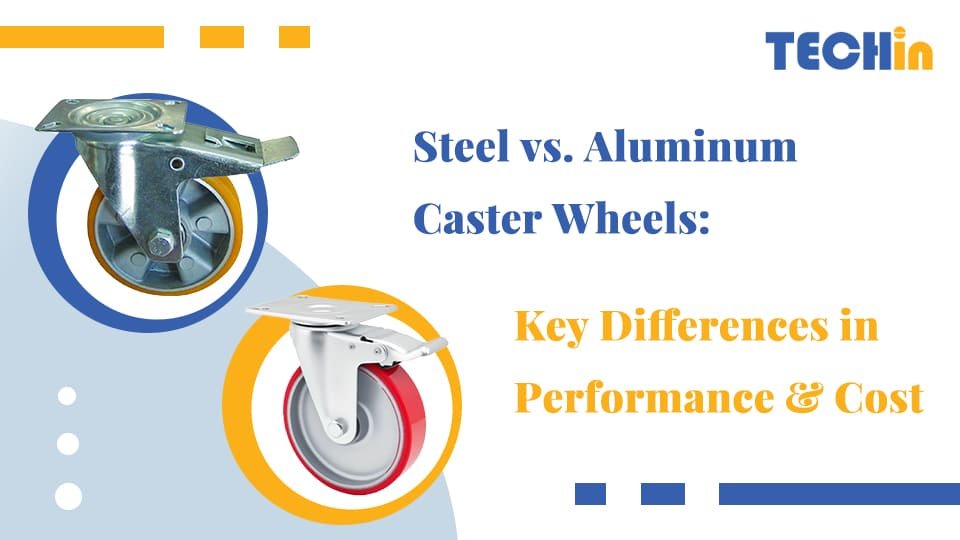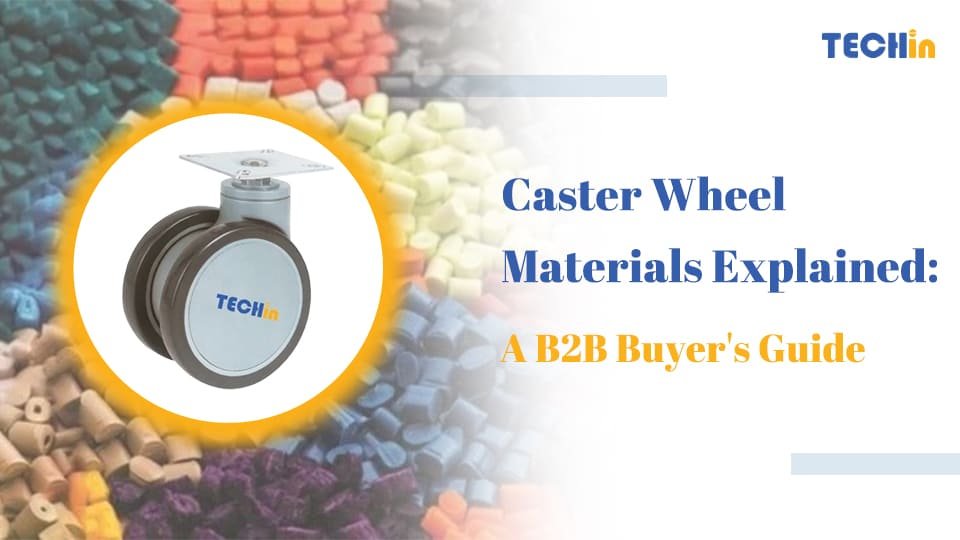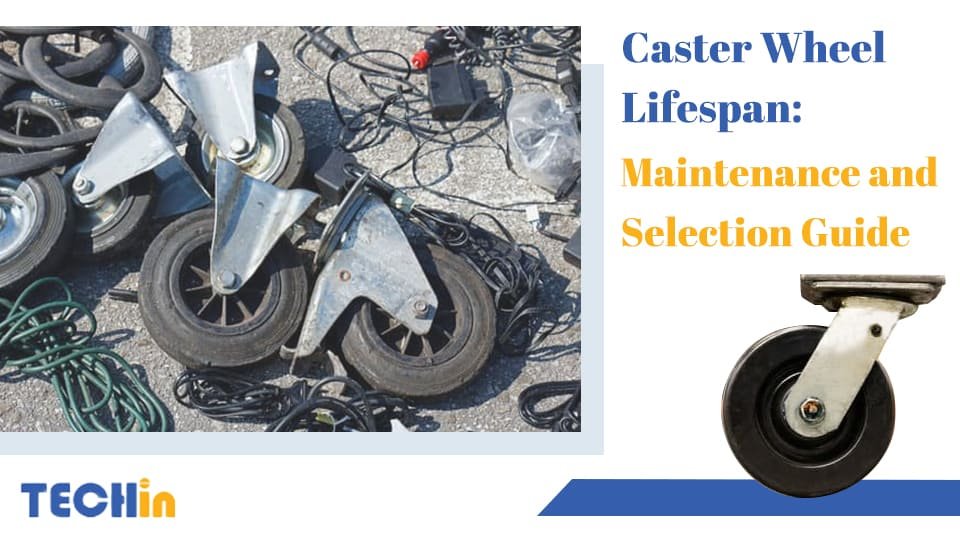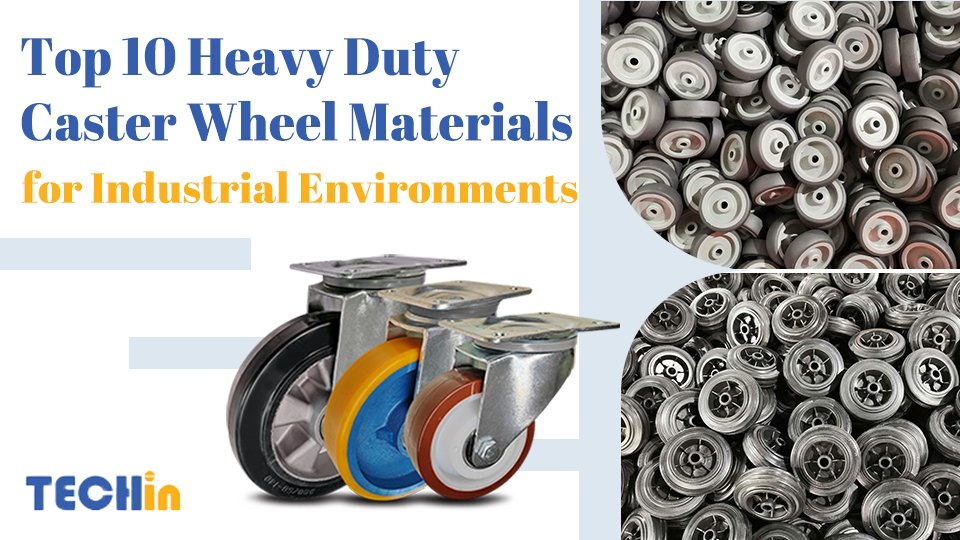When it comes to heavy machinery, choosing the right caster wheel is crucial. With so many materials—rubber, steel, and polyurethane—how do you know which one is best? In this article, we’ll dive deep into the benefits and differences of each material to help you make an informed decision for your industrial applications.
What Are Rubber Casters?
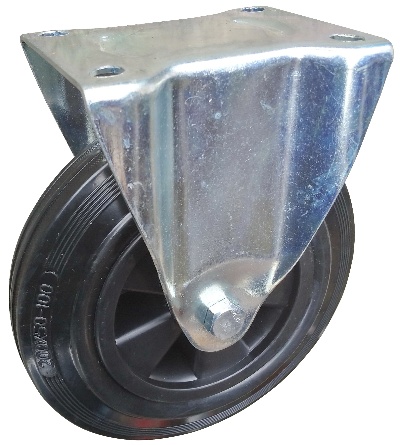
Rubber casters are made with a rubber material that provides excellent shock absorption and floor protection. These casters are commonly used for lighter loads and indoor settings, where noise reduction and smooth movement are needed. The flexible nature of rubber allows it to cushion impact, making it ideal for sensitive environments.
Rubber casters are commonly seen in applications like medical equipment, office furniture, and light industrial machinery, where noise reduction and floor protection are paramount.
Benefits of Rubber Casters
- Cushioning & Floor Protection: Rubber is soft and absorbs impact, reducing damage to floors. This is especially important in environments with delicate or expensive flooring like hardwood or tile.
- Low Noise: Rubber casters are incredibly quiet, making them ideal for quiet environments such as hospitals, hotels, and offices where minimal disturbance is required.
- Versatile in Light to Medium Loads: These casters work well for moderate weight applications, offering easy movement and reduced friction on smooth surfaces.
What Are Steel Casters?

Steel casters are made from solid steel and offer exceptional strength and durability. These casters excel in handling heavy loads, making them ideal for extreme conditions such as high-weight applications and rough terrain. Steel casters are frequently used in industries like construction, manufacturing, and warehouses.
These casters can endure the rigors of high-stress environments, but they lack the floor protection of rubber and polyurethane. If floor damage is a concern, steel casters may not be the best option.
Benefits of Steel Casters
- Heavy Load Capacity: Steel casters handle extremely heavy weights with ease, making them perfect for industrial machinery and large equipment. They are built to last under pressure and in harsh conditions.
- Durability: Steel casters are resistant to wear and tear, ensuring they last longer in demanding environments like factories, warehouses, and construction sites.
- Cost-Effective: Steel casters are often more affordable than polyurethane casters for high-load applications, making them a cost-effective solution for heavy-duty machinery.
What Are Polyurethane Casters?

Polyurethane casters are made from a synthetic polymer that combines the benefits of rubber and plastic. These casters are designed to offer the best of both worlds: the cushioning and floor protection of rubber with the durability and strength of steel. Polyurethane casters are ideal for industries that require a balance of load-bearing capacity, smooth movement, and floor protection.
Polyurethane is known for its high resistance to wear, chemicals, and extreme temperatures, making it perfect for environments where both strength and protection are needed.
Benefits of Polyurethane Casters
- High Load Capacity: Polyurethane casters can handle heavier loads than rubber, making them ideal for medium to heavy-duty machinery.
- Chemical Resistance: These casters are resistant to oils, solvents, and other chemicals, making them perfect for industries that deal with harsh substances, such as automotive, food processing, and pharmaceuticals.
- Versatility & Durability: Polyurethane casters offer a blend of flexibility, durability, and resistance, allowing them to work well across a variety of applications. They can be used on a range of flooring types and in diverse environments.
Comparison: When to Choose Rubber vs. Steel vs. Polyurethane
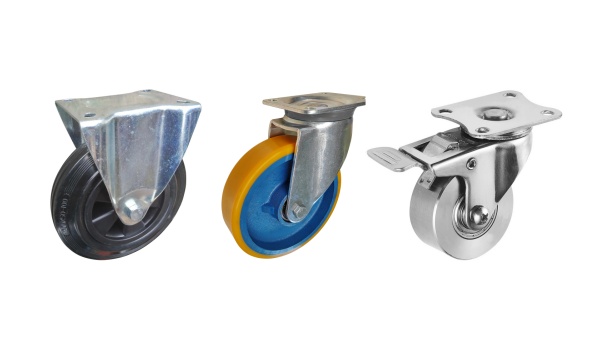
| Aspect | Rubber Casters | Steel Casters | Polyurethane Casters |
|---|---|---|---|
| Best For | Light to medium loads, noise-sensitive areas | Heavy loads, rugged environments | Heavy loads, versatile industrial use |
| Load Capacity | Low to moderate | High | Moderate to high |
| Floor Protection | Excellent (soft, absorbs impact) | Poor (can damage floors) | Good (protects floors while handling heavy loads) |
| Durability | Moderate | Very high | High |
| Noise Level | Low (ideal for quiet environments) | High | Moderate (quieter than steel, but not as silent as rubber) |
| Chemical Resistance | Low | Low | High (resistant to oils, solvents, etc.) |
| Ideal Environments | Offices, hospitals, light industrial | Heavy-duty machinery, construction | Factories, automotive, food processing |
| Cost | Low to moderate | Low to moderate | Moderate to high |
- Rubber: Best for lighter, noise-sensitive applications with moderate load requirements. Rubber casters are great for environments where floor protection and minimal noise are key, but they may not perform well under heavy-duty conditions.
- Steel: Ideal for extremely heavy loads and rough environments, such as construction sites or industrial machinery, where load capacity is crucial. However, steel casters can damage delicate flooring and generate noise.
- Polyurethane: The most versatile choice, offering a balanced combination of load capacity, durability, and floor protection. Polyurethane casters are ideal for industrial settings that require both strength and the protection of floors from damage. They also work well in environments with exposure to chemicals or extreme temperatures.
FAQs
Q1. What is the best material for heavy-duty casters?
For heavy duty applications, steel casters are often the best choice due to their high load capacity and durability in extreme conditions. However, if you need a balance of performance and protection for floors, polyurethane casters are an excellent choice as they can handle heavy loads while providing a smoother, more protective ride. Rubber casters are generally better for lighter applications due to their cushioning properties.
Q2. Which is better, rubber or polyurethane casters?
Polyurethane casters outperform rubber casters in terms of load-bearing capacity and durability. Polyurethane is more resistant to wear and tear, chemical damage, and can handle higher loads without deforming. On the other hand, rubber casters are better suited for quieter operations and provide superior shock absorption, making them ideal for environments where noise reduction and floor protection are important.
Q3. What are the disadvantages of polyurethane wheels?
While polyurethane casters are versatile and durable, they do have some drawbacks. At high speeds or in high-impact situations, their rolling resistance is higher than that of rubber casters, leading to increased wear and decreased efficiency. In contrast, steel casters may be more efficient for high-speed applications but may not offer the same level of floor protection.
Q4. What type of casters are best for smooth floors—rubber, steel, or polyurethane?
For smooth floors, polyurethane casters are generally the best choice as they provide a balance between load-bearing capacity and floor protection. Rubber casters are also good for smooth floors, especially in environments where noise reduction is key, but they may not handle heavy loads as well as polyurethane. Steel casters, while durable, can damage smooth floors due to their hardness.
Summary
Choosing the right caster wheels—whether rubber, steel, or polyurethane—depends on your machinery’s needs and the environment it operates in.By knowing the pros and cons of each, you can make a good decision that enhances performance, durability, and cost-effectiveness.



